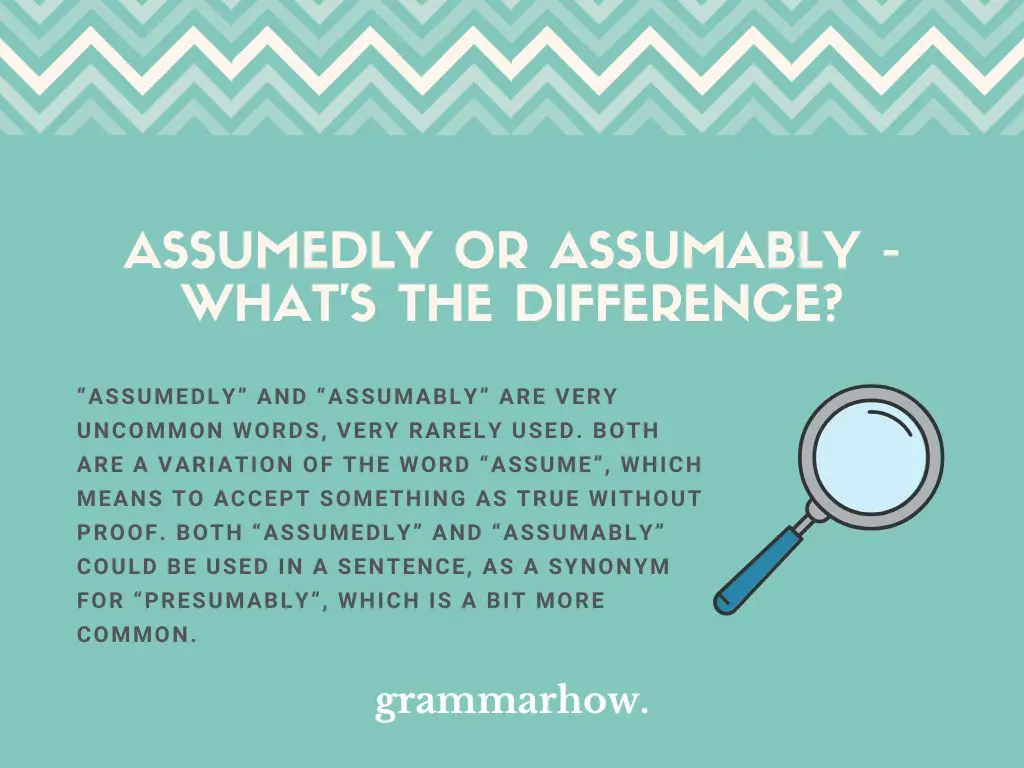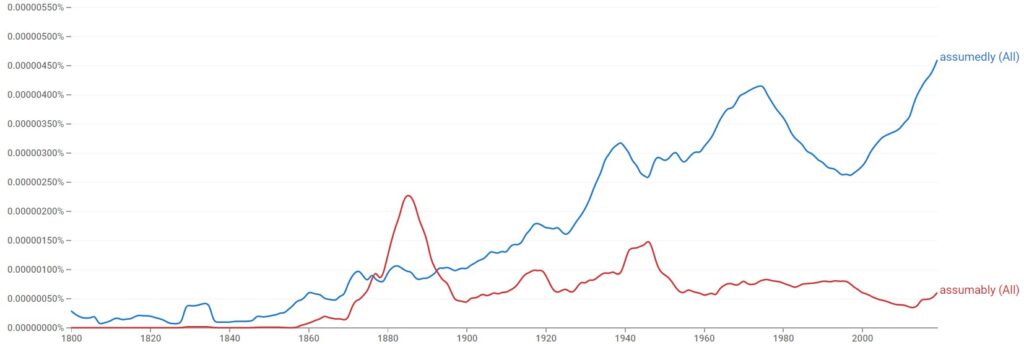When making an assumption, do you use the word “Assumedly” or “Assumably”?
We want to know which form of the word is correct, what’s the precise meaning of it, and the most appropriate way to use it in our speeches. We also want to know if any should be avoided.
Assumedly or Assumably – What’s the Difference?
“Assumedly” and “Assumably” are very uncommon words, very rarely used. Both are a variation of the word “Assume”, which means to accept something as true without proof. Both “Assumedly” and “Assumably” could be used in a sentence, as a synonym for “Presumably”, which is a bit more common.

Take a look at the examples below:
- After the crash, the group was assumedly dead.
- After the crash, the group was assumably dead.
- After the crash, the group was presumably dead.
As you can see by the examples, both forms of the word work. They are considered correct and acceptable, despite being uncommonly used and not very colloquial.
As added in the third sentence, the word “Presumably” carries the same meaning and is an option you’d likely see more often in books, or the news, for example. For that reason, we recommend that you leave “Assumably” and “Assumedly” to more formal situations.
Assumedly
“Assumedly” is a variation of the word “Assume”, which means to suppose or take something for granted. This is a word that expresses that a piece of information is being treated as true, despite the lack of proof of it.
The Cambridge Dictionary doesn’t acknowledge “Assumedly” as a word. The Merriam-Webster Dictionary, however, forwards the reader directly to the word “Assumed” when you search for “Assumedly” – indicating that it acknowledges the word as a variation of “Assumed”, which is the paste tense of “Assume”.
Let’s go over some helpful examples:
- The writings assumedly date back thousands of years.
- The disease assumedly spreads through respiratory droplets.
- Finn was assumedly torn up after the breakup.
- Assumedly, Juan speaks Spanish.
- John assumedly follows the example of his father, who passed away years ago.
A common synonym for “Assumedly” is the word “Presumably”. This is likely the word you’re more used to, that fulfills the same purpose of indicating something that’s taken for granted.
We recommend you use “Presumably” in your daily conversations and leave “Assumedly” for more formal situations or audiences.
Assumably
Like “Assumedly”, “Assumably” is a variation of the word “Assume”, which means (among other things) to pretend to have a different name or be someone you are not. You can use both “Assumably” and “Assumedly” in your sentences, whenever you feel you must.
“Assumably” isn’t recognized as a word by The Cambridge Dictionary. However, The Merriam-Webster Dictionary recognizes it as a variation of “Assume”. It tells us that its use is appropriate and acceptable.
Here are some good examples:
- She was, assumably, out with her friends.
- Assumably, Ms. Velez will be the teacher of the class.
- Assumably it was Anna that took Paul’s guitar.
- The native indigenous were assumably the first inhabitants of that land.
- I didn’t even call Peter, because his explanation would assumably be too technical for me to understand.
“Assumably” is a very uncommon word. Usually, people would say “Presumably” before thinking about “Assumably”, because it’s more colloquial and common.
Keep in mind that although “Assumably” is correct, you should leave it for more formal instances and polished audiences.
Which Is Used the Most?
Which one of those forms is used more often, “Assumably” or “Assumedly”? Take a look at the graph from Google Ngram Viewer below.

“Assumedly” is the most common word, when compared to “Assumably”.
“Assumably” had its peak around 1885, a long time ago. And since 1900 the difference in usage between the two forms has only increased.
Although both words are acceptable, you must consider that they are very formal and rarely used. Consequently, “Assumedly” is likely the best option to be incorporated into your vocabulary, if you feel the need to choose only one.
Final Thoughts
“Assumedly” and “Assumably” are variations of the word “Assume”, meaning that a fact is being taken for granted, despite the lack of proof. You can use both forms and rest assured you’d be correct. “Assumedly” and “Assumably” are very formal and rarely used, so you should them on formal occasions.

Martin holds a Master’s degree in Finance and International Business. He has six years of experience in professional communication with clients, executives, and colleagues. Furthermore, he has teaching experience from Aarhus University. Martin has been featured as an expert in communication and teaching on Forbes and Shopify. Read more about Martin here.
